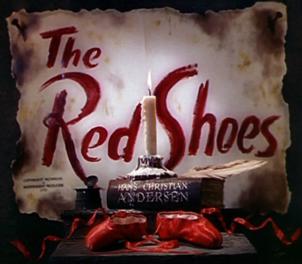
(Michael Powell & Emeric
Pressburger, 1948)
Doc M pays homage to a Cinematic
Masterpiece:
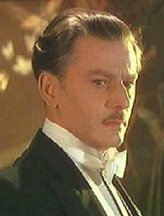 The
Archers take on Art with a capital A: Æstheticism as a
life-philosophy, Sergei Pavlovich Dyagilev and the
Ballets Russes. And it works: a
magnificent, moving film, not just about ballet but Art as a
vocation, a religion. It is a Romantic-Æsthetic epiphany.
Remarkably for a film of this era, the hero is a wise, dignified,
elegant, inspiring, 50-ish gay man, courageously played by a
gay actor. As Michael Powell wrote:
The
Archers take on Art with a capital A: Æstheticism as a
life-philosophy, Sergei Pavlovich Dyagilev and the
Ballets Russes. And it works: a
magnificent, moving film, not just about ballet but Art as a
vocation, a religion. It is a Romantic-Æsthetic epiphany.
Remarkably for a film of this era, the hero is a wise, dignified,
elegant, inspiring, 50-ish gay man, courageously played by a
gay actor. As Michael Powell wrote:
...there was no question in our minds as to
who should play him, and give a performance filled with
passion, integrity, and, yes, with homosexuality.
Million Dollar
Movie, pp 276-8
Austrian actor Anton Walbrook (Adolf Anton Wilhelm
Wohlbrück, 1896-1967) is passionate, imperious and ultimately
heartbreaking as Boris Lermontov. The fact that he wasn't even
nominated for a Best Actor Oscar is a disgrace. (It's sad that this
great star of German, British and French film is now somewhat
neglected outside Powell & Pressburger/Max Ophüls/Thorold
Dickinson fandoms - although he was the subject of a commemorative
exhibition, The Most Beautiful Man in German
Film, at the Gay Museum in Berlin and Düsseldorf Film
Museum in 1997.)
The evolution of The Red Shoes
began in the 1930s, with a plan for a Nizhinskii biopic
starring Paul Muni and Charles Laughton, and, later, a romantic
melodrama intended as a vehicle for Alexander Korda's wife, Merle
Oberon (whose dancing would have been performed by a double). War
intervened, and the project resurfaced afterwards with renewed vigour
- without Korda and Oberon, who had split up, and with real ballet
stars in acting roles. The project retained strong echoes of the
Ballets Russes, in particular the
Dyagilev-inspired rôle of Boris, and in a plot echoing some of
the personal and professional conflicts sparked by the marriages of
Dyagilev's protegés Vaslav Nizhinskii and Leonid
Myasin/Massine. The latter even appears in the film as Grigorii
'Grisha' Lyubov, the choreographer and character-dancer. And the
Polish girl who had assisted Nizhinskii with his choreography for
Sacre de Printemps makes a cameo
appearance as herself: Marie Rambert, one of the founding mothers of
British ballet.
Mainstream English-language cinema has often reflected a wider
cultural anti-intellectualism - but not the Archers!
The Red Shoes is a film about
ideals and philosophical values, as much as it is about ballet, or
(superficially) a 'love story'. Powell famously described it
thus:
...we had all been told for ten years to go
out and die for freedom and democracy, for this and for that,
and now that the war was over, The Red
Shoes told us to go and die for Art.
But Art was already a front-line on which people had been
dying or being persecuted for years at the hands of Stalin, Hitler,
Franco & al.. Pressburger, who had escaped the Nazis, and
Powell, who had extensive pre-war experience of working in Europe,
knew this, as did many of their creative team. They had already
depicted artists and intellectuals as heroes in wartime: Philip
(Leslie Howard) in 49th Parallel,
striking back in the names of Picasso, Matisse and Mann against Nazi
destruction of 'decadent' Art; the young airman Peter (David Niven)
in A Matter of Life & Death,
who is a promising poet. In The Red
Shoes, all the main characters are artists:
dancers, musicians, designers, creative visionaries, inhabiting their
own society with its own system of values. The High Society glimpsed
beyond (the Countess's party, Irina's 'civilian' life in Paris) is
glamorous but shallow; more everyday post-war life (like the Notting
Hill setting of the Ballet Rambert's Mercury Theatre) grey and
drab.*
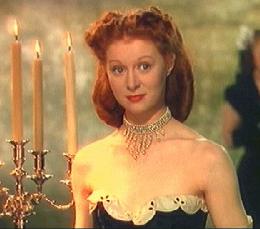
Moira Shearer as
Vicky
The plot is deceptively simple, but contains layers of symbolism
and depths of characterisation which - combined with its visual and
musical richness - make it one of the greatest films about Art. Vicky
Page, a beautiful and gifted dancer from an aristocratic family, is
discovered by Boris Lermontov, director of a famous ballet company.
He recognises in her a kindred spirit, capable of rising to great
artistic heights, and sharing his own profound sense of
vocation:
Boris: Why do you want to
dance?
Vicky: Why do you want to live?
As Vicky, Moira Shearer, the Dunfermline-born ballerina, has a
touching charm in her acting and dances magnificently. Her appealing
screen presence combines glamour and youthful innocence (she was only
21 at the time of filming).
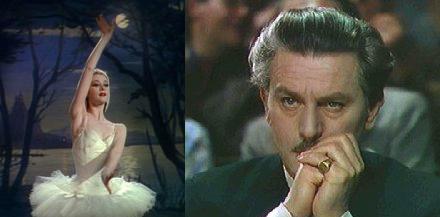
Vicky spots a familiar face in the
audience at the Mercury Theatre
Boris is convinced of Vicky's commitment when he sees her dance
the rôle of Odette in Lac des
Cygnes one rainy afternoon in the Mercury Theatre. This
shabby, under-equipped place is the home of the Ballet Rambert: it
has no orchestra, the music being provided by a faulty gramophone.
But it is a true temple of the art, presided over by a woman who
worked with Dyagilev and Nizhinskii. Vicky's ecstatic performance
there proves to Boris that she has the potential for greatness.
Boris also engages Julian Craster, an enthusiastic music student
who contacts him because his tutor Professor Palmer had plagiarised
the score of the company's latest ballet from him. Boris dissuades
the boy from taking this further and publicly humiliating his tutor.
He shrewdly observes that surely "it is far more disheartening to
have to steal than to be stolen from": a lesson in
magnanimity and nobility.
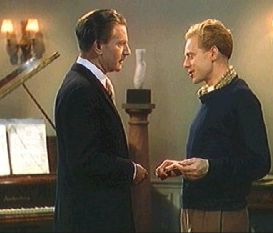
Julian (Marius Goring) gets the
chance to compose
In Paris, Julian is soon commissioned to work on a ballet based
on Hans Christian Andersen's macabre fable
The Red Shoes. Meanwhile, Boris
sacks the scatterbrained but loveable prima ballerina Irina because
she is "imbecile enough to get married" - something he regards as
incompatible with true dedication to dance.
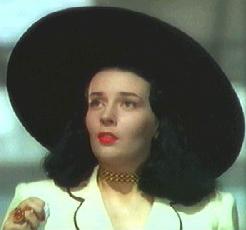
Irina (Ludmila Tchérina) is
left behind when the Company goes to Monte Carlo
We are taken through the progress of the ballet's creation to its
successful first performance.
Boris: And don't forget: a great
impression of simplicity can only be achieved by a great agony
of body and spirit.
But as a result of working together on the ballet, Julian and
Vicky become attracted to each other. Boris, with boyish enthusiasm,
has already been sharing with Vicky plans for her future in all the
great rôles. He has commissioned Julian to work on a new ballet
for her, La Belle Meunière
(thematically, surely a nod to Le Tricorne/
El Sombrero de Tres Picos, the ballet which Massine
choreographed for Dyagilev, with music by de Falla, about a miller
and his beautiful wife). He books dinner - rather than an expression
of romantic interest, it seems more likely (given his character) that
this is to tell her about this new project especially for her -
something special, exciting. (After all,The
Red Shoes had been in gestation before she and Julian
joined the company, with a score by a South American composer.) But
Vicky cannot be found. She is not even at Grisha's birthday party -
but, as Ivan and the others reveal, has gone off for the evening with
her lover... Boris is profoundly disappointed: she's let him down,
let herself down. He had thought he had recognised in her a kindred
spirit. It's also just a few months since Irina's dismissal: having
just got a new leading-lady, he's going to have to go through the
same again... After a quarrel, he dismisses Julian, and Vicky decides
to leave with her lover.
The main characters agonise over their choices. Boris wants to
punish Vicky's failure to live up to the commitment she had at first
professed, but he knows that she could still become a truly
great dancer - so he cannot let his bitter disappointment ruin her
career completely. His better instincts triumph, after an inner
struggle dramatised in the mirror scene. The only contractual
restriction he places on her is over The Red
Shoes: that ballet belongs to the company, and no-one else
will dance it again. He seeks out and re-engages Irina, who has been
living a glamorous but superficial life as a socialite, and has
missed her old friends. She stars again in the company's new season,
touring the world.
But Vicky is unhappy. Once married, she becomes frustrated at the
stifling of her own talent, while Julian is preoccupied with writing
an opera, Cupid & Psyche. It
is based on the Classical myth of the secret lovers Cupid and Psyche,
who overcome the hostile plots of his mother Venus: is this how he
sees his conflict with their parent-figure, Boris? For Julian,
Vicky is an inspiring muse, not an active artist in her own right. We
see her getting out of bed to offer emotional support as he works
through the night. (She and Julian have twin beds - perhaps a comment
on their relationship, rather than '40s film censorship: after all,
in a similar scene in Dangerous
Moonlight (1941), Carol got out of a double bed to
find Stefan at work.) She frets over her pointe shoes, stored in a
drawer. Some, pointing to the scale of the apartment, argue that this
scene may be less a naturalistic depiction than a dramatisation of
Vicky's perception of her situation. On the other hand, the size of
the interior and the grand piano may suggest that she and Julian are
dependent on her aristocratic family, perhaps living in a wing of her
aunt's mansion. She will later say that she has been continuing going
to class, and has danced some roles, but evidently nothing major; and
the satin shoes in the drawer - including a red pair - are her
souvenirs of her time with the Ballet Lermontov, not her practice
ones.
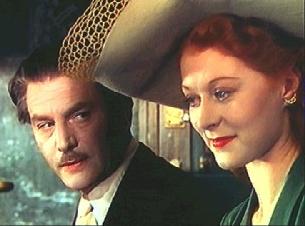
"Put on the Red Shoes, Vicky, and
dance for us again!"
Vicky returns to the Riviera on a holiday with her aunt, Lady
Neston. She surely must know that she is returning to the company's
orbit. She is easily persuaded by Boris to return to the stage of the
Monte Carlo Opera House in a revival ofThe
Red Shoes. However, shortly before the performance, Julian
arrives - having fled the première of his own opera:
Vicky: You left your first night!
Julian: Yes - why didn't you ?!
He demands that she return to London with him on the 8 pm train.
She asks him to wait until after the performance, but he tells her
that will be "too late": she must leave with him, before the
performance, or their marriage is over. Boris then appears, and the
two men quarrel, with Vicky in the crossfire.
Boris [to Julian]: Would you
be satisfied with anything less than the best? - If you would,
you would never be a great artist - Perhaps you never will!
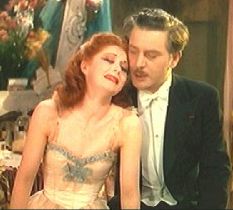 She
has to make a choice, and at first appears to do so, reassured by
Boris. Then she panics, bolts, and plummets from a terrace in front
of the train Julian is about to catch. As in the ballet, she asks for
her red shoes to be removed, so that she can die in peace... Boris,
grief-stricken, informs the audience. The performance goes ahead,
with the leading role taken by a spotlight.
She
has to make a choice, and at first appears to do so, reassured by
Boris. Then she panics, bolts, and plummets from a terrace in front
of the train Julian is about to catch. As in the ballet, she asks for
her red shoes to be removed, so that she can die in peace... Boris,
grief-stricken, informs the audience. The performance goes ahead,
with the leading role taken by a spotlight.
The ballet scenes (especially the Heckroth-designed Expressionist
Red Shoes itself) have a strong
visual appeal, and Vicky's story is dramatic enough. However, it is
Boris who is the moral centre and soul of the film. If, as a viewer,
you can't engage with him and his idealism,
The Red Shoes is not going to
'work' for you on anything but the simplest level. I've encountered
this in some on-line reviews: people who see him as some sort of
negative authority figure because he places Art above heterosexual
'romance'. Sorry, kids: Boris - a profoundly good and wise
character of a kind one rarely meets in films - is right.
Julian is such a two-faced, arrogant, callow little ingrate, it's
difficult to see how anyone could side with him: it was all I could
do not to reach through the screen to slap him when he sneers
about ballet being "a second-rate form of expression" to the man to
whom he owes his career! Mind, locking him in a broom-cupboard with a
looped recording of Le Sacre de
Printemps and Les
Noces might be more appropriate as a punishment:
"Second-rate? Tell that to Stravinskii, sonny!" (Marius
Goring deserves all credit for playing such an unlikeable 'romantic
juvenile lead': a music-school Angel Clare. It's a splendid piece of
acting, equal to his foppish French heavenly Conductor in
A Matter of Life &
Death.)
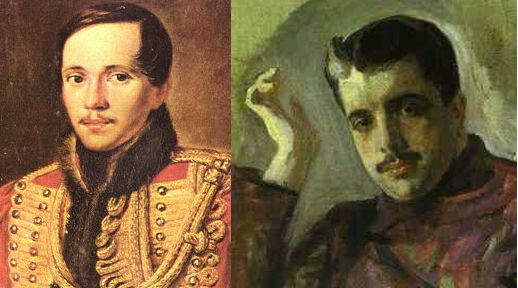
Mikhail Yur'evich Lermontov &
Sergei Pavlovich Dyagilev:
Boris owes something to both (besides the
moustache)
Boris's Scots-Russian surname identifies him with Russian
Romanticism through the tragic young poet and novelist Mikhail
Yur'evich Lermontov (1814-41): only the name of Pushkin carries
similar significance. The artist as tormented, passionate prophet and
outsider is a recurrent theme in Mikhail Yur'evich's poetry
(especially The Demon). In his
prose, Pechorin, the ironically-designated
Hero of Our Time, prefigures Meursaut in Camus's
L'Etranger in some respects. But
Boris is no cynical 'superfluous person'. He is more an embodiment of
the russkaya dusha - the 'Russian Soul' - and of idealistic
Romanticism contrasted with mere lower-case 'romance'. Art, for him,
is not just a career, but a sacred vocation. How much of Mikhail
Yur'evich's poetry did Emeric Pressburger know? Seeing Boris at Lady
Neston's party, with his polite contempt for the superficiality
around him -
Boris [on Ballet/Art]: ...For
me it is a religion. And one doesn't really care to see one's
religion practised in an atmosphere such as this. I hope you
understand.
- one is reminded of How often, amid a
motley crowd..., while the poignant, dramatic mirror-scene
evokes the atmosphere of Ennui and
Sorrow! and the tragic protagonist of
The Demon.
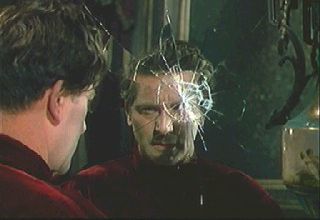
It is vital for a 21C audience to remember that Boris is a
Russian of a generation which knew that Art could kill. For
some 30 years he has been an émigré, unable to go home,
unable even to write home since relatives, friends or lovers who
received communications from the West could be arrested. There's
something oddly moving about the way he still has his tea made with a
samovar, and drinks it through a sugar-lump: still maintaining
the domestic habits of a Russian gentleman after 30 years in exile.
(It's a lovely detail of acting by Anton.) The other older Russians
have their own coping mechanisms: Grisha's playful chirpiness cloaks
a sensitivity we see in his farewell to Irina and his reaction to
Vicky's death. These are men without a country, probably still
travelling on the Nansen passports given to refugees by the League of
Nations in 1922. Ivan and Irina, from a younger generation of
Russians, seem a bit spoilt - but then they're the children of
émigrés. As Ludmila Tchérina did in reality,
they would have grown up in straitened circumstances in White Russian
communities, so they make the most of the material side of life now
they've access to a bit of money and glamour. Given their home base
is in Monaco, they would have been affected by the wartime occupation
of France and the Vichy regime on their doorstep., and by the
knowledge of the agonies of their own homeland. The company is a
surrogate 'family' - Boris describes it as such - a safe space for
people who are exiled from the mainstream by 20C history (as Russian
émigrés) or (in some cases) by sexual orientation.
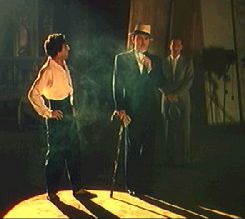 Into
this world of émigrés and refugees come Vicky and
Julian: eager youngsters, implicitly too young to serve in the war,
from safe, privileged British backgrounds (Vicky's aunt is a
Countess, and Julian, a music student, seems rather a Hooray-Henry).
How can they understand commitment and sacrifice in the same
way as a man who, at their age, had seen his world overturned by
revolution and civil war? When Boris speaks of the "doubtful comforts
of human love" in comparison with Art, the implication is that he
knows what he is talking about. Family, lovers and friends can
all be taken away from you, but Art can only be wrested from you by
killing you. (I should like to show The Red
Shoes in a double-bill with Polanski's
The Pianist: the latter shows the
hero being gradually robbed of social moorings and human ties - but
holding fast to his art as a life-line.)
Into
this world of émigrés and refugees come Vicky and
Julian: eager youngsters, implicitly too young to serve in the war,
from safe, privileged British backgrounds (Vicky's aunt is a
Countess, and Julian, a music student, seems rather a Hooray-Henry).
How can they understand commitment and sacrifice in the same
way as a man who, at their age, had seen his world overturned by
revolution and civil war? When Boris speaks of the "doubtful comforts
of human love" in comparison with Art, the implication is that he
knows what he is talking about. Family, lovers and friends can
all be taken away from you, but Art can only be wrested from you by
killing you. (I should like to show The Red
Shoes in a double-bill with Polanski's
The Pianist: the latter shows the
hero being gradually robbed of social moorings and human ties - but
holding fast to his art as a life-line.)
And when Boris tells Vicky that he wants her to dance
The Red Shoes with the ecstasy he
saw in her only once before at the Mercury, there is a precise but
untranslatable Spanish term for the concept he is trying to express:
duende. It is this quality which she loses when she becomes
preoccupied with Julian. It is also a word understood by a real-life
hero, another inimitably stylish gay man passionately committed to
theatre, poetry and dance; an artist and enabler of other people's
art, for whom Art and Life were indivisible. Federico García
Lorca is another of the ghosts from the front-line of Art who haunt
the imaginative hinterland of the film's era - only 12 years after
his murder by a Fascist firing squad. Boris's defensiveness hardly
seems extreme in historical context.
The Red Shoes makes a
salutary change from much contemporary cinema, in which it is
difficult to imagine the characters being capable of serious thought
or having a life of the imagination. Too many films confuse heroism
with mere machismo: moral/spiritual courage and integrity are what
count, not sexual orientation or conformity with gender
stereotypes. Too many films ignore the fact that one can be
middle-aged, going grey, yet still retain a passionate
idealism: being 'older and wiser' doesn't have to mean selling out,
losing one's principles, and becoming cynical. Boris is a film-hero
with whom I can imagine talking happily for hours about art, beside
the samovar: my ideal older brother. In fact, how people react to him
has become another of my 'sheep-from-goats' (or perhaps here,
'swans-from-geese'?)** litmus-tests, since I cannot imagine having
much common ground with anyone (male or female, gay or straight) who
doesn't love him!
You see, for me too, Art is "a religion". An art historian and
historian, I spent the better part of a decade 'fighting the good
fight' in spite of repeated job-rejections and the living on a
shoe-string of intermittent short-term, part-time work and longer
stretches of unemployment. But I survived it still believing,
not having sold out or allowed myself to be utterly broken in spirit.
By the time I found The Red Shoes
again, it felt like a reward for coming through - a bit dented, but
undaunted. When I think of my favourite moments, favourite lines from
this film, I raise my head a little higher, walk a little taller,
face the world a little more bravely. It's a film one grows
into: you need to have accumulated your own battle-scars and grey
hairs for the cause to get the most from it. Emeric, here's a
posthumous thank-you for such a great script and characterisations -
a thank-you for understanding!
*The film originated as a pre-war script, and there is little
direct evidence of the recent conflict. However, the women's New Look
fashions and the name-checking of Jacques Fath's fashion house are
hard to ignore as anchoring the story in the post-war period.
**I am thinking partly of Lac des
Cygnes, of Andersen's Ugly
Duckling, and of his literary rival Kierkegaard's likening
of the attitude of critics and Mundanes in general to "being trampled
to death by geese".
Return to Top


 The
Archers take on Art with a capital A: Æstheticism as a
life-philosophy, Sergei Pavlovich Dyagilev and the
Ballets Russes. And it works: a
magnificent, moving film, not just about ballet but Art as a
vocation, a religion. It is a Romantic-Æsthetic epiphany.
Remarkably for a film of this era, the hero is a wise, dignified,
elegant, inspiring, 50-ish gay man, courageously played by a
gay actor. As Michael Powell wrote:
The
Archers take on Art with a capital A: Æstheticism as a
life-philosophy, Sergei Pavlovich Dyagilev and the
Ballets Russes. And it works: a
magnificent, moving film, not just about ballet but Art as a
vocation, a religion. It is a Romantic-Æsthetic epiphany.
Remarkably for a film of this era, the hero is a wise, dignified,
elegant, inspiring, 50-ish gay man, courageously played by a
gay actor. As Michael Powell wrote:




 She
has to make a choice, and at first appears to do so, reassured by
Boris. Then she panics, bolts, and plummets from a terrace in front
of the train Julian is about to catch. As in the ballet, she asks for
her red shoes to be removed, so that she can die in peace... Boris,
grief-stricken, informs the audience. The performance goes ahead,
with the leading role taken by a spotlight.
She
has to make a choice, and at first appears to do so, reassured by
Boris. Then she panics, bolts, and plummets from a terrace in front
of the train Julian is about to catch. As in the ballet, she asks for
her red shoes to be removed, so that she can die in peace... Boris,
grief-stricken, informs the audience. The performance goes ahead,
with the leading role taken by a spotlight.

 Into
this world of émigrés and refugees come Vicky and
Julian: eager youngsters, implicitly too young to serve in the war,
from safe, privileged British backgrounds (Vicky's aunt is a
Countess, and Julian, a music student, seems rather a Hooray-Henry).
How can they understand commitment and sacrifice in the same
way as a man who, at their age, had seen his world overturned by
revolution and civil war? When Boris speaks of the "doubtful comforts
of human love" in comparison with Art, the implication is that he
knows what he is talking about. Family, lovers and friends can
all be taken away from you, but Art can only be wrested from you by
killing you. (I should like to show The Red
Shoes in a double-bill with Polanski's
The Pianist: the latter shows the
hero being gradually robbed of social moorings and human ties - but
holding fast to his art as a life-line.)
Into
this world of émigrés and refugees come Vicky and
Julian: eager youngsters, implicitly too young to serve in the war,
from safe, privileged British backgrounds (Vicky's aunt is a
Countess, and Julian, a music student, seems rather a Hooray-Henry).
How can they understand commitment and sacrifice in the same
way as a man who, at their age, had seen his world overturned by
revolution and civil war? When Boris speaks of the "doubtful comforts
of human love" in comparison with Art, the implication is that he
knows what he is talking about. Family, lovers and friends can
all be taken away from you, but Art can only be wrested from you by
killing you. (I should like to show The Red
Shoes in a double-bill with Polanski's
The Pianist: the latter shows the
hero being gradually robbed of social moorings and human ties - but
holding fast to his art as a life-line.)